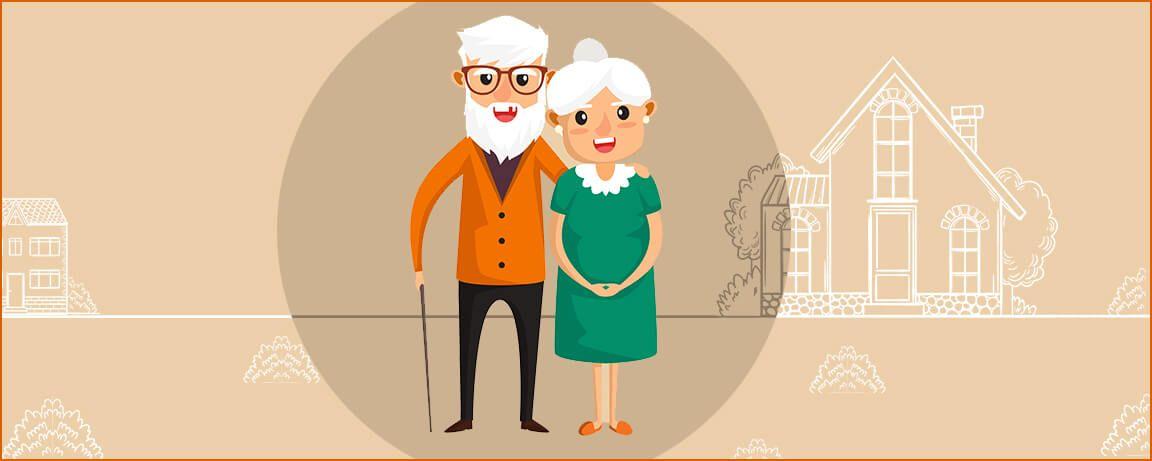Reverse Mortgage: The Road to Smart Investment for Senior Citizens
With an improved standard of living conditions, life expectancy in the country has seen a gradual and steady increase. This has been made possible by medical treatments that often come at a high cost thereby increasing the financial burden of senior citizens to a considerable extent.
As a result, a concept known as ‘reverse mortgage‘ was introduced in India back in 2007 to ensure that senior citizens can live a financially independent life, not having to rely on anyone to deal with their regular expenditures.
The Concept of Reverse Mortgage
A reverse mortgage, in the simplest of terms, can be explained as a variant of Loan Against Property that can be availed of by the borrower by way of regular income, as opposed to a conventional loaning system.
In this system, the borrowers (senior citizen) mortgage their property (house) to the lender (bank/financial institution), to receive payments from the latter at regular intervals while the former continues to stay in their house till death.
Working Principle of Reverse Mortgage
A reverse mortgage or Loan Against Property works on a simple principle.
When you mortgage your property to a bank, its value is derived by the bank based on several predetermined criteria such as demand and supply factors, and prices of immovable property among others. After arriving at a value, the bank or the financial institution lends you a certain amount in the form of a loan at regular intervals. With the reception of each payment, your equity in the house decreases.
The system of ‘reverse mortgage’ is best for those senior citizens who are looking for secure investment options without having to invest in foreign avenues such as stocks or mutual funds. Using your home as a wealth-generating instrument can be an excellent investment decision, especially for those senior residents who retire with limited sources of daily income.
Benefits of Reverse Mortgage to Senior Citizens
Given its inherent advantages, more and more senior citizens are availing the benefits that a reverse mortgage has to offer.
Take a look at some of them:
1. Prepayment of the Amount of Loan
One of the greatest benefits of Availing a Loan Against Property by way of the reverse mortgage is that a borrower can repay the amount of loan at any time during the tenure for which the loan has been taken. Adding to it is the benefit that you do not have to pay charges or any kind of penalties while opting for the prepayment option.
2. Taxability
A reverse mortgage also looks after your tax liability. Any amount received by way of periodic payment through a reverse mortgage is treated as a loan and not income. As a result, such an amount is not liable to be taxed under the Income Tax Act, 1961 and therefore would be exempt from it. However, the borrower would be charged with a capital gains tax at the time of alienating the mortgaged property to repay the loan taken.
3. Valuation of Property
Another benefit of a reverse mortgage is that the property has to be revalued by the bank after a gap of 5 years every time. This essentially means that in case, during such valuation, if the value of the property has increased, borrowers in such circumstances can opt for increasing the loan value. As a result, they are given the increased amount as a lump sum.
4. Settlement of the Loan Amount
Settlement of the loan only takes place once the borrower has passed away. However, in case the borrower who has died has a spouse living in that house, they can continue to live in it. Settlement of loan is subject to the death of both, the husband as well as the wife.
5. Tenure of Mortgage
While most banks offer mortgage tenure of 10-15 years, some banks have also begun to offer tenure of 25 years to borrowers. This means that the concept of reverse mortgage provides a long-term solution to senior citizens to ensure a steady flow of income to deal with routine expenses.
Who is Eligible for a Reverse Mortgage?
The Central Government has specified a few loans against property eligibility rules that a senior citizen should fulfill to avail the profits of a reverse mortgage.
1. You should be the owner of the house, and the property should be located in India.
2. If your spouse applies as a co-applicant, then the spouse should not be below the age of 58 years.
3. The property in question should be free from any sort of encumbrance or liability.
4. The property should be your permanent residence, and you should be residing in it.
Settlement of Loan
A reverse mortgage is settled when both spouses die or when the borrower decides to sell off the property. Initially, the bank invites the kin of the senior citizens to settle the loan alongside interest; however, in case of failure to do so, the bank reserves the right to recover the loan amount from the sale proceeds of the house.
While any additional amount made on a sale is passed on to the heirs of the deceased, loss, if any, is borne by the bank individually.
Reverse Mortgage - A Financial Aid to Senior Citizens
The idea of a reverse mortgage is relatively new in India. Although it comes with a handful of drawbacks such as lengthy documentation processes and capping of maximum loan amount among others, it is still gaining popularity among the masses in India. It provides financial liberty and autonomy to several senior citizens who are looking for viable and feasible wealth maximization investment options.
You can also check the key aspects and differences between equitable mortgages and registered mortgages.
To apply online for Credit Cards, Secured Loans and Unsecured Loans, visit www.mymoneymantra.com, the leading online lending marketplace that offers financial products from 100+ Banks and NBFCs. We have served 5 million+ happy customers since 1989.


